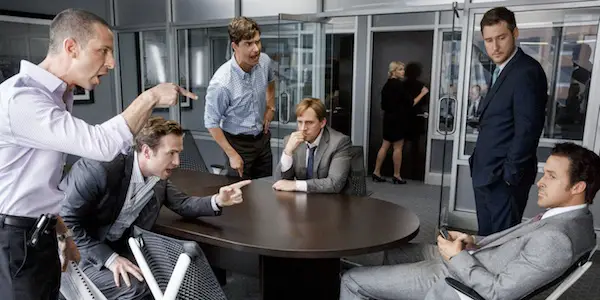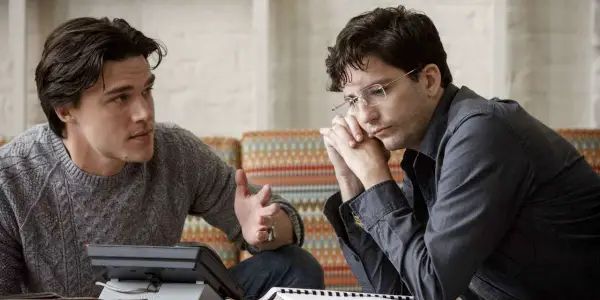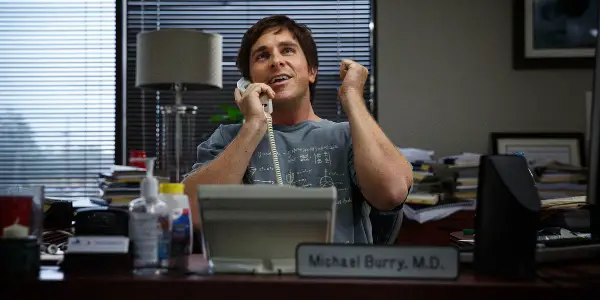The Nominated Film You May Have Missed: THE BIG SHORT

Stephanie Archer is 39 year old film fanatic living in…
Every year, ten movies are bestowed the honor of becoming nominated by the Academy. Many of these films will have already had various successes throughout the year – festivals, box office and other prestigious awards. Yet, only one ends the night being declared the best of the best.
With the height of award season over, many movie goers will find themselves looking forward to the summer box office releases, as well as the beginning of a new round of breakthrough films. There is no longer a rush to see the movies that would be going head to head, and as many have already been released for home viewing, they can now be seen at any time.
I have created this monthly segment to highlight some of those films that many may have never seen. It is with this monthly segment that I hope to bring viewers back to these films that didn’t win the golden statue, yet should be remembered and given the chance by viewers all the same.
This month, I would like to highlight The Big Short. For many readers, this may be surprising as this movie was a contender just this year. So why choose a movie still so fresh out of award season?
I feel that this movie is one that many may have written off from the start. Based on the subject matter, moviegoers may have had a perceived notion that The Big Short would be boring, uninteresting and a waste of money. While its limited release was a massive success, the worldwide release of the film on December 23, 2015 was less than promising, only bringing in $10.5 million dollars on its opening weekend.

I feel this was one of the movies that got away from viewers this year, yet one that is so important for them to see. The events of this movie are something everyone should watch, and understand – if not for knowledge of the past, but a warning for the future.
The Plot
The future is something we all wish we had the chance or the power to see. Yet, what if the future you saw was unavoidable, dark and profitable, what would you do? This is a question that is examined in Adam Mckay’s film The Big Short.
The film follows three separate groups of people in 2005 who have quantified and predicted the inevitable fall of the Housing Market. Seeing an opportunity for profit and success, they bet against the bank’s supposedly “solid” mortgages that American citizens have signed themselves into.
Every number has been run and rerun, and when 2007 hits, they will be hitting the jackpot of a lifetime while the American economy crumbles. Yet, The Big Short is not just about the fall of the American economy in 2007, it also brings us face to face with the evil of the world – money. We need it to survive, but it is the foundation on which we falter most.

We see not only the corruption of the banking world, but also those who are willing to profit from the fall out of financial greed and remain silent – not the slightest forewarning to American citizens who will be left in shambles when the collapse arrives. There is a moment in the film when those who are set to profit from the greed of the banking world are cheering on their exploits when they are reminded of what they are cheering for – the disintegration of our economy.
The Director
From the very beginning of the film, it is clear to see why, earlier this year, Adam Mckay was awarded the Academy Award for Best Director. The movie is light on its feet, whisking through the introduction – using ingenious cut-aways to help the momentum of the story while also allowing clear-cut explanations of banking’s more difficult terms to viewers.
While Mckay’s direction throughout the beginning of the film is upbeat and brings a sense of wonderment, it quickly deteriorates into a shocking and ineluctable end. With a subject matter that has the potential to be tedious, Adam Mckay keeps viewers invested from start to finish.

The Actors
A star-studded cast only continues to elevate the overall film. Christian Bale plays Michael Burry, an eccentric hedge fund manager, who first identifies the inevitable failure in the Housing Market. The breath of life he breathes into his character is authentic and sets the stage for the entire film.
Steve Carell continues to show his immense talent in the field of drama, playing Mark Baum, the overly hot-headed, pessimist of the film. His performance is one of the most captivating, as he carefully handles the contradictory and overwhelming variety of emotions of this role.
Rounding out this stellar cast, Ryan Gosling and Brad Pitt bring their own strong performances to the film. Beginning as the film’s narrator, Ryan Gosling is introduced to viewers as Jared Vennett, a trader for Deutsche Bank and an individual who encapsulates how greed evolves and adapts to changing environments.
Through his performance, Gosling masterfully embodies and embraces the purest form of evil displayed in The Big Short. Contrasting Gosling’s character, Brad Pitt plays Ben Rickert – a character who left the financial industry years earlier and who plays the films “Jiminy Cricket”. Brad Pitt delivers a simple yet direct performance, reminding characters and viewers alike what all this greed leads to – and who will be left to pick up the pieces.
For many individuals, this movie may be a dark reminder of the collapse of the housing market and the subsequent depression America fell into. For others, this may be a clarification and an understanding of not only what happened, but a possible warning to future generations that greed and corruption never lead to good. The Big Short is a must see film – one that should be on the top of everyone’s viewing lists.
Have you seen The Big Short? Tell us what you thought in the comments!
Does content like this matter to you?
Become a Member and support film journalism. Unlock access to all of Film Inquiry`s great articles. Join a community of like-minded readers who are passionate about cinema - get access to our private members Network, give back to independent filmmakers, and more.












